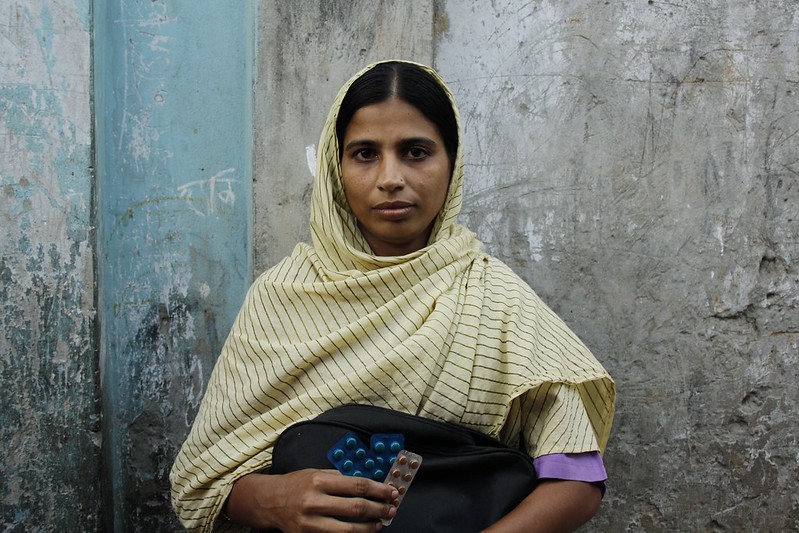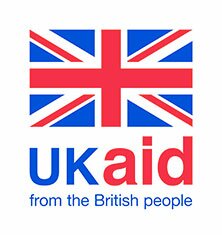Community health workers (CHWs) form the , especially in low resource or remote settings. They are central to the delivery of essential health services, including reproductive, maternal, new-born and child health (RMNCH) services. But they are also an indispensable part of the health workforce during health emergencies, and play an important role in the prevention, screening and management of diseases.
This is a brief summary of a rapid review of the literature by Maintains in response to the ongoing COVID-19 outbreak. The review explores the barriers and facilitators affecting CHW response to epidemic disease outbreaks based on recent epidemics, and identifies opportunities to strengthen their role in shock-responsive health systems. The review looked at factors affecting the response to recent outbreaks, and how other CHW services were affected during the response. A related literature review has explored the broader impact of epidemic disease outbreaks on health services, recovery measures, and potential reform policies.
Community health workers and recent epidemic disease outbreaks
Lessons from the 2014 Ebola Virus Disease (EVD) outbreak and other communicable disease outbreaks show how CHWs carry out key functions in detection, prevention, and response to the outbreak. They also undertake responsibilities for the identification, reporting, and referring of cases, and serve as community educators and mobilisers, engaging in communication and dissemination of information on preventive measures, whilst maintaining routine service delivery.
Despite the overwhelming nature of the EVD outbreak, the majority of CHWs remained active in their communities and were willing to continue providing services, and many did so in the early days of the outbreak without formal direction or remuneration, while braving several supply-side and systemic challenges. CHWs also play a critical role in pandemic preparedness, and are essential to building trust and relationships between the formal health system and communities.
However, several factors may limit their performance during outbreaks, both related to the role of CHWs in responding to an epidemic, and in continuing routine services during it.
Factors affecting CHW performance in outbreak management
In the EVD outbreak, gaps in knowledge and skills regarding appropriate response, diagnosis, and prevention were linked to CHWs’ poor educational background, potential lack of information to engage in timely response, and other challenges associated with their routine service delivery. However, Niger appeared to benefit from an investment in health workforce training which aided rapid action in response to the EVD crisis, and this holds promise for building system resilience. Studies also indicate that could address gaps in CHWs’ knowledge.
Disease outbreaks pose a significant threat to the health of the CHWs themselves, and it is argued that the risk of infections from diseases like EVD and Marburg virus disease (MVD) are occupational hazards among health workers who often work in epidemic management. Protection of the frontline workforce must be of primary importance. In addition, adequate compensation and rehabilitation are important, although the variation in how CHWs are remunerated (some salaried, some paid through incentives, some volunteers) affects how this can be done. Improved remunerations and support were associated with improved and more complete reporting during the EVD outbreak in Sierra Leone and increased take-up of RMNCH services in Liberia in spite of the EVD pandemic.
Safety of health workers
These lessons have been , with protection and safety of all health workers in the line of duty considered as a right, along with access to compensation, rehabilitation, and curative services.
In addition, gaps in supply of personal protective equipment (PPE) were a central challenge in ensuring CHWs had adequate protection from infection during their work in disease management. However, the current pandemic, and previous experiences indicate that supplies of PPE are inadequate across contexts, but especially acute in pandemic responses in remote geographies, where they are perhaps needed most.
Emotional toll on CHWs is a critical but under-researched area. EVD destroyed CHWs’ social connectedness and sense of trust in health facilities, communities, and families. They felt alone, disrespected, and ostracised. A range of coping strategies have been identified, reflecting resilience of the health staff who were seen to rely on self-protection, familial support, task shifting, and using own resources to deal with outbreaks. But this highlights the and to deal with protracted stigma as a longer-term effect of the pandemics.
The role of gender is a very important consideration, in particular as the majority of CHWs are women. Gender has manifested itself across different aspects such as the type of worker, remuneration, and the burden of household and professional activities. Gender may also be a facilitator when it comes to engaging deeply with households and vulnerable populations within.
Trust in health workers and the health system at community level in many cases may influence community engagement. Robust community engagement (CE) is an essential part of resilient health systems. Meaningful CE has been credited with , and there have been measures to in three EVD-affected countries. Sierra Leone’s Basic Package of Essential Health Services 2015-2020 highlights the need for community members to volunteer to interface between the health facility and community.
Maintaining routine services
Maintaining routine services is important to minimise secondary effects. The EVD epidemic led to a sharp decline in routine service delivery by CHWs at the start of the outbreak in Guinea, Liberia, and Sierra Leone, including the reporting and management of childhood malaria, diarrhoea, and pneumonia. This is in part due to changes in demand for health care and partly due to a shift in health care focus, but points to potential secondary or indirect health system-level effects through reduction in access to health care, lower trust in health systems, and death counts substantially exceeding those related to the pandemic (indirect mortality).
Adequate supervision (along with policy directives and others) is one way to support CHWs with routine service delivery. When CHWs were provided with necessary directives, support, and convergence with other frontline staff, service delivery resumed. Eventually, CHWs were also seen to be more effective working with the community to carry out EVD-specific activities than outsiders, pointing to resilience in community-CHW relations, and approaches to support this are now included in the .
The review aims to highlight factors which may influence critical CHW services, not only in the current pandemic response, but in recovery and reform. It also highlights the crucial role that CHWs play, especially for poor and vulnerable communities, and in remote and under-resourced areas.
The full rapid literature review can be found here.
The literature review was authored by Shuchi Srinivasan, MLE Research Coordinator, OPM, and Radhika Arora, Research Manager, OPM. This summary was authored by Nick Hooton, Research Uptake Strategic Advisor for Maintains.
All Maintains evidence and articles relating to COVID-19 can be found here.
About Maintains
Maintains aims to save lives and reduce suffering for people in developing countries affected by shocks such as pandemics, floods, droughts, and population displacement. This five-year programme, spanning 2018–2023, is building a strong evidence base on how health, education, nutrition, and social protection systems can respond more quickly, reliably, and effectively to changing needs during and after shocks, whilst also maintaining existing services. With evidence gathered from six focal countries – Bangladesh, Ethiopia, Kenya, Pakistan, Sierra Leone, and Uganda – Maintains is working to inform policy and practice globally. It also provides technical assistance to support practical implementation.
This output has been funded by UK aid from the UK government; however, the views expressed do not necessarily reflect the UK government’s official policies. Maintains is implemented through a consortium led by Oxford Policy Management www.opml.co.uk.



